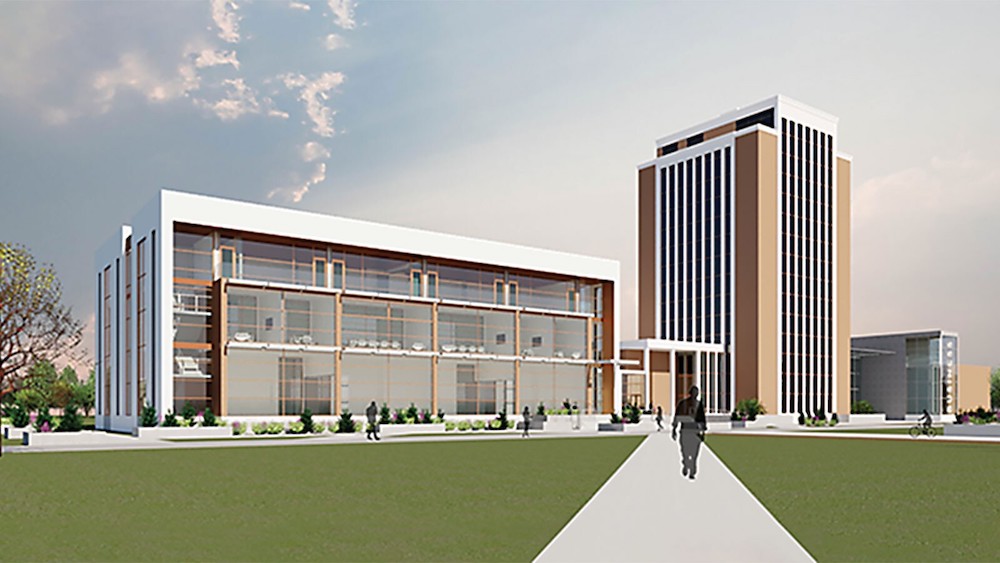Jon M. Huntsman School of Business receives $2.5 million donation
The Larry H. & Gail Miller Family Foundation announced a contribution of $2.5 million to the Jon M. Huntsman School of Business at Utah State University to build a new experiential learning program.
The contribution adds to the $4 million the Miller family has given the Huntsman School to fund earlier projects, including $3 million towards Huntsman Hall.
The experiential learning program will require approximately $50 million in funding, a near match to the approximately $50 million raised to build the Huntsman Hall expansion completed in 2016.
When asked about the contributions from the Miller family, Dave Patel, the assistant dean at the Huntsman shared, “Larry Miller was a big entrepreneur, and the Miller family has funded other entrepreneurship programs across the state.”
Along with the Miller family’s contributions, other philanthropic efforts have built USU’s business school to what it is today since its foundation in 1888.
According to Patel, universities rely on philanthropy to help support their mission.
“State or taxpayer funding, student tuition, and philanthropy—that’s more or less to large parts of our budget. For the Huntsman school, we probably average maybe 25% to 30% of our annual budget coming from philanthropy,” he said.
Patel made it clear that, while only about a quarter of the budget, it’s still a lot of money.
“The biggest part of that philanthropy is scholarships,” Patel said. “This past year, the Huntsman school awarded over $4 million in scholarships. That’s all from philanthropy.”
Patel added that philanthropy also helps to fund special projects. Of the $50 million needed for the Huntsman Hall addition, over $30 million came from philanthropy.
But, these special projects aren’t just to make campus look pretty. These new facilities, particularly the planned experiential learning program, are substantial in what they are able to provide students.
“We know from research and we know from having seen it—this is my 12th year here—that it’s not just classroom learning that’s going to help set our students up for success when they leave school. We have some of these programs already, so we know that it works,” Patel said.
While there already are entities such as the Entrepreneurship Center, the Covey Leadership Center, a recently added entrepreneurship minor, and a new data analytics center approved and on the way, the business school needs spaces for these growing and developing programs.
But, with only a few spaces left for classes, clubs, and faculty and staff, the administration is looking for the experiential program addition to house the array of lab experiences and programs students participate in while pursuing their studies.
Ethan Jensen, a student at the business school, has greatly appreciated his time at the Huntsman.
“I think (the business school) does a great job of keeping people involved and giving the right involvement opportunities,” Jensen said. “The biggest thing that I think the Huntsman school is a success at in comparison to the other schools on campus is that it has a lot of good placement opportunities, and does a really good job of placing students. Anybody from the Huntsman School can get a job.”
Jensen explained that the business school invests deeply into its students’ education, pointing out that most schools have graduate students teach undergraduate business courses, whereas the Huntsman school hires professors to do so instead.
“It’s super awesome to get that mentorship,” Jensen said.
Jensen recalled when he went to Puerto Rico during spring break with the Covey Leadership Center and had a chance to speak with Alex Dunn, co-founder and CEO of Executive Network Partnering Corporation (ENPC) and former CEO of Vivint Solar.
According to Jensen, Dunn shared he believes higher education is misguided in the way it’s taught because “memorization and classes don’t exactly give you the experience that’s needed to start your career. People are looking a lot more towards your experiences than they are looking at your degree.”
From his encounter with Dunn, Jensen learned that it’s more about the people you know than it is about the education received a lot of times.
The Miller family’s contribution was a challenge donation, meaning the $2.5 million came after the Huntsman School raised another $2.5 million from other organizations to match the Miller family.
The new experiential program building will be built where the parking lot east of Huntsman Hall currently sits.
As part of a larger project, all the housing between there and the fine arts buildings will be torn down to make room for more parking and new housing.
The Huntsman school hopes to have the fundraising and building accomplished in a shorter time frame than the Huntsman Hall expansion project, which took approximately four years.
The above picture is an architect’s rendering of the proposed building.
-Michael.Popa@usu.edu
Photo credit: Utah State Today

